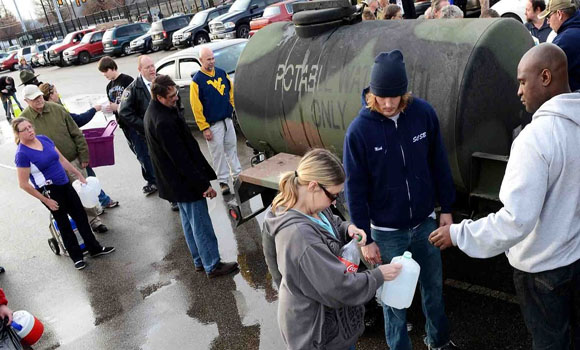
Are You Ready? Deadly Chemical Contaminates West Virginina Water Supply
Truther
There has been a developing crisis in West Virginia effecting over 300,000 people across nine counties. Currently the State of West Virginia has declared a state of emergency in these areas due to severe water contamination. Citizens can no longer use tap water to drink, bathe, wash, or cook with.
Grocery stores have had a run on all bottled water sources and shelves emptied out. Tanks of potable(drinkable) have been being brought in to assist. As you can imagine life has changed dramatically for these residents. Numerous businesses have had to shut down as well.
The cause of the contamination appears to be a chemical spill from a local industrial company. How long residents will have to discontinue use of their tap water is unknown. It is being reported that the levels of chemicals in the water have diminished but are not gone.
Think about this just a bit – no water. None. Zero. Gone. Many of these folks just found themselves in an emergency situation that they were not prepared for. If a “simple” chemical spill can cause this kind of problem imagine what a planned terrorist attack could do.
I know with this happening it has got me thinking of my water-preps a little more. I have placed too much emphasis on filtration and not enough on actual, physical water storage. Fix is in the works.
How about you? What if your water supply became contaminated and you were unable to even filter it?
Straight out of the gate, one of the prepper-procrastinator methods of water storage went right out the window. There was no way to fill up bathtubs or other large holding containers to get through the time with no water. If you didn’t have it stored before the chemical spilled, you weren’t going to have it during this crisis.
How would you have done during this? If you had gotten a notice on Thursday about your water being only fit for flushing, how well would you have handled it? Now think about your weekend, what did you do this weekend, and would you have been able to do all of that with your water out?
I’ll start. Thursday I was at work and hubby was at home with the kids, so he would likely have gotten word first, then passed it on to me. I work in the next county upstream from our water source, so it’s possible I could have filled my personal water bottle before coming home, and maybe grabbed a gallon of water and one of juice from the grocery store on my way home. I only mention juice because we don’t normally have any in the house, and I can see the kids enjoying some juice treats to mitigate the water rationing.
We have at least 50 bottles of water in the basement, plus 2 gallon jugs. For 4 people, 2 adults/2 kids. Even 5 days after the spill, nobody is saying when the water will be potable again. So, just for the sake of this post, let’s assume it will be an even week before the water comes back. (That assumption in real life though is a tricky one, as it’s key to figuring out how to divide up the water you have.) In my case that works out to 7 bottles a day for my family. To be used for drinking and basic sanitation. One of the gallon jugs would probably go sit on the diaper changing table since we normally use cloth wipes and tap water for cleaning baby’s butt. One gallon would go straight to the kitchen for simple cooking, oatmeal and rice come to mind.
So that’s roughly 24 oz of drinking water per person, per day, for a week. Any showering or sponge bathing would either have to come out of that, or we’d have to find one of the tanker trucks of water and fill some buckets. (During the non-freezing parts of the year I have 55 gallons rain water stored for cleaning and such.) That’s doable I think, the juice and fruit in the house would help. We stayed at home all weekend and cleaned and cooked. Obviously cleaning would have been curtailed. Cooking could have happened, I roasted veggies, I just couldn’t have cleaned up very well afterwards.

